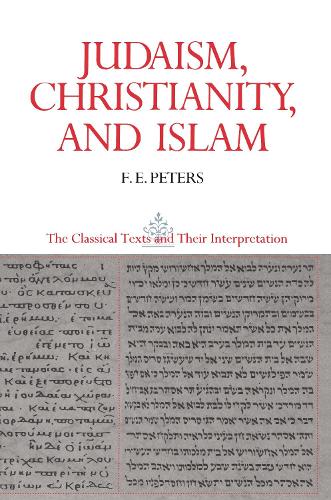
Judaism, Christianity, and Islam: The Classical Texts and Their Interpretation, Volume II: The Word and the Law and the People of God
(Paperback)
Available Formats
Paperback
Published: 2nd January 1991
Paperback
Published: 23rd October 1990
Paperback
Published: 23rd October 1990
Publishing Details
Judaism, Christianity, and Islam: The Classical Texts and Their Interpretation, Volume II: The Word and the Law and the People of God
By (Author) Francis Edward Peters
Princeton University Press
Princeton University Press
23rd October 1990
United States
Classifications
Professional and Scholarly
Non Fiction
Spirituality and religious experience
291
Physical Properties
Paperback
424
Width 152mm, Height 235mm
709g
Description
Invoking a concept as simple as it is brilliant, F. E. Peters has taken the basic texts of the three related--and competitive--religious systems we call Judaism, Christianity, and Islam and has juxtaposed them in a topical and parallel arrangement according to the issues that most concerned all these "children of Abraham." Through these extensive passages, and the author's skillful connective commentary, the three traditions are shown with their similarities sometimes startlingly underlined and their well-known differences now more profoundly exposed. What emerges from this unique and ambitious work is a panorama of belief, practice, and sensibility that will broaden our understanding of our religious and political roots in a past that is, by these communities' definition, still the present. The hardcover edition of the work is bound in one volume, and in the paperback version the identical material is broken down into three smaller but self-contained books. The second, "The Word and the Law and the People of God," discusses the scriptures of the three faiths in various contexts, exegetical and legal.Throughout the work we hear an amazing variety of voices, some familiar, some not, all of them central to the primary and secondary canons of their own tradition: alongside the Scriptural voice of God are the words of theologians, priests, visionaries, lawyers, rulers and the ruled. The work ends, as does the same author's now classic Children of Abraham, in what Peters calls the "classical period," that is, before the great movements of modernism and reform that were to transform Judaism, Christianity, and Islam.
Reviews
"It will be most useful for readers who want to compare three religions with the aid of a scholar skilled in comparative method and substantive research."--Choice
Author Bio
F. E. Peters is Professor of Near Eastern Languages and Literatures, History, Hebrew, and Judaic Studies at New York University.
